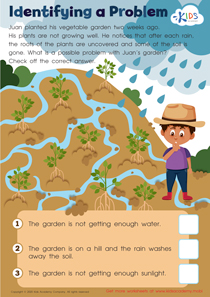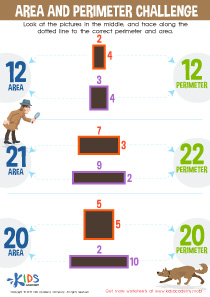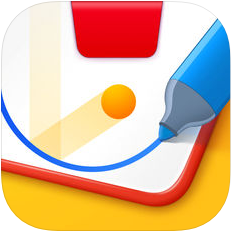6 results
Our Plants Lessons program offers a fun and engaging way for preschool, kindergarten, grade 1, grade 2, and grade 3 children to learn about plants. Through interactive worksheets, educational videos, and assessment quizzes, children will be introduced to the fascinating world of plants and their importance in our lives. With topics ranging from plant life cycles to parts of a plant, this program is designed to build a strong foundation in plant science while fostering a love for nature. Our lessons are perfect for homeschoolers, classrooms, and after-school programs. Choose our Plants Lessons program for a well-rounded and enjoyable educational experience.
Introducing children to the diverse flora around them through plants lessons can be an engaging way to meet educational objectives while encouraging an appreciation for the environment. These lessons, designed for children in preschool through Grade 3, feature interactive worksheets, online videos, and assessment quizzes to reinforce learning.
Preschoolers and kindergarteners learn about different parts of plants, their functions, and the natural processes they undergo as they grow. Simple worksheets such as coloring, matching, and word recognition activities can be included in the lessons to engage their little minds. Videos featuring cute and animated plants and catchy songs can also be used to provide an entertaining way of introducing the plant kingdom and its importance to them. Test quizzes in the form of true/false and multiple-choice questions, along with educational games, can be an interactive way to assess what they have learned.
Grade 1 students can delve deeper into plants through the use of more complex activities such as matching plant parts to their functions, grouping plants based on specific criteria, and learning about plant life cycles. Videos highlighting various plant classifications such as deciduous and evergreen trees, flowering plants, and carnivorous plants can provide additional learning opportunities. Assessment quizzes designed with fill-in-the-blank, essay, and matching questions can give feedback on how much of the material students grasped from the lessons.
In Grade 2, plants lessons can be further expanded to look at the environments that plants grow in, including water, air, and soil. Students can learn about the importance of photosynthesis and the functions of plant cells. Interactive quizzes featuring diagrams and flowcharts can be used to gauge the comprehension of students and reinforce key concepts in the lessons.
Grade 3 students should start learning about basic botanical vocabulary and plant classification. They can look more closely at plant adaptations, including how different plants adapt to thrive in specific environments and regions worldwide. Videos highlighting plant features, such as leaf shape, root type, and stem structure, can be used to give students a more in-depth understanding. Interactive worksheets in the form of crosswords, word finds, and matching can assist students in retaining the material while making the process fun.
In conclusion, for students in preschool through Grade 3, plants lessons can be an effective way to introduce students to the natural world by encouraging an appreciation for the environment and complexities of plant life. Interactive worksheets, online videos, and assessment quizzes all play an integral part in reinforcing learning and providing students with opportunities to engage in different instructional methods according to their learning styles.
















